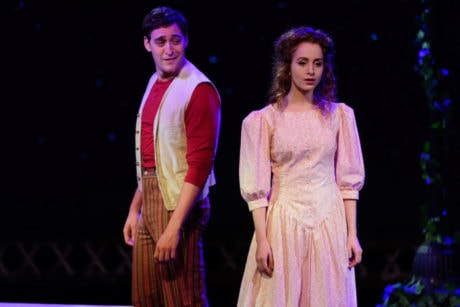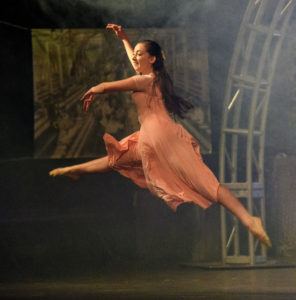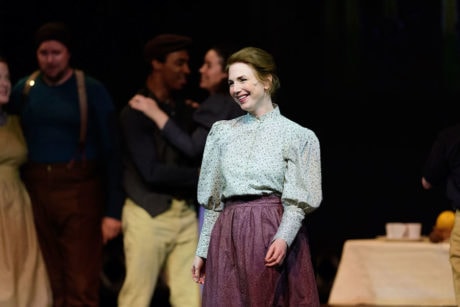Musical Heaven. Is there a better way to describe the production of Carousel at the Media Theatre?

It would be hard to find a better-sung production than that given by the surpassingly youthful professional company assembled by director Jesse Cline. The evening allows us to savor again Richard Rodgers’ amazing ability to deliver compositions that are expected yet simultaneously surprising. Just as you think a melody is heading in the perfect direction, it takes a startling turn that slips from beautiful to sublime. Oscar Hammerstein’s lyrics are simple, profound, and profoundly singable all at once. Spinal chills are common.
These classics such as “If I Loved You,” “You’ll Never Walk Alone” and “Blow High, Blow Low” are deceptively difficult to sing, but the entire company sails through with taste, phrasing and exalted beauty. If you’ve never heard this music before, this is a great place to begin.
Hammerstein Americanized the Hungarian play Liliom, moving it to a village in New England in the early 1900s. Billy Bigelow is a loner who makes a living as a barker on a carousel for a traveling carnival. He falls in love with another loner, mill worker Julie Jordan, but their marriage is troubled. When Billy is unable to make a living and discovers he will be a father, he turns to a life of crime. It’s a sad story that only a brilliant score could sustain.
Joseph Spieldenner and Maxwell Porterfield sing Billy and Julie with thrilling purity. Spieldenner is a comely rogue who exudes self-confidence and macho intensity. Porterfield is a naive waif willing to give up anything to be with her charismatic man.
Director Cline has also carefully cast the supporting roles. Oftentimes these come off as annoying: Carrie and Mr. Snow try to ratchet up the comedy with cute mannerisms and quirks, while Mrs. Fowler is usually the earthy equivalent of The Sound of Music’s “Climb Every Mountain” nun. But this time Madalyn St. John, George Slotin, and Elisa Matthews (respectively) take on these roles, and they are played with simple, honest, dignified grace and charm. Carl Smith is the villainous Jigger who tempts Billy, Susan Mattson is the controlling boss who desires Billy for herself, and Kelly Briggs is the religious zealot mill owner. Once the action moves to Heaven, Jim Conte is an irascible Starkeeper.

The ensemble deserves special mention. Back in the day of the original production, singers were separate from the august Agnes de Mille dancers, and they fled to the sidelines as the dancing commenced. Here the ensemble are both superior singers and dancers, as is currently expected in 21st Century musicals. The director has trimmed the choreography to make the show run a very modern 2 ½ hours. The ever-employed and always-excellent choreographer Dann Dunn contributes a shortened, scaled down version of the Act Two ballet that captures the feeling of de Mille’s original. Beada Briglia dances the role of Louise.
Ben Kapilow discerningly directs the music, and the seven musicians do their best with a score written for twenty-four players.
It’s unfortunate that the technical aspects are uneven. Set Designer Matthew Miller has moved the fishing village setting to the industrial revolution, with a proscenium filled with metal girders and the castoffs of a factory. All props are on the open stage at all times. Boxes or chairs are occasionally moved to indicate scene changes, along with the switching of a few black and white projections. The result is a visual downer, especially when the scenes in Heaven fail to impress. This effect is contradicted by the exquisite costumes by Carol Sorenson, which are pure Hammerstein. The full de Mille skirts are flowing throughout “June is Bustin’ Out All Over,” the fisherman have the expected colorful suspenders and vests, and as time goes by the characters age and grow gracefully. This is complimented by Steven Spera’s subtle lighting.
Yet despite this production’s many strengths, this Carousel fails to pack the emotional wallop we expect from a classic Rodgers and Hammerstein musical. One reason is that it is so difficult to produce in a way that addresses its dramatic complications in a satisfying way. The Media’s Carousel succeeds as a musical event, but we have no idea why Julie and Billy are attracted so deeply, or why they do the things they do.
Finally, it is time to address the concept of sound design. This falls into two schools: the Cameron Mackintosh method, with shows like Les Miserables, where the sound is very subtly enhanced and almost unnoticeable, and the Tommy/KPOP school, where the creative blueprint is part of the entire production. Carl Park’s design at the Media is loud, and the music and voices emit from the speakers above the stage rather than the performers. The live orchestra sounds recorded, as do the actors’ voices. This led to a dramatic moment on opening night when, right in the middle of Billy’s massively demanding “Soliloquy,” his mike gave out. Spieldenner, a skilled performer and singer did not disappear. He became more excitingly human, as we heard every word and note. The great finale of the song was the musical highlight of the evening. Special thanks must also go to the excellent acoustics of the old Media Theatre, which is, after all, a former vaudeville house.
Carousel is challenging to produce in our era. Many thanks are due to the Media Theatre for letting us hear it again.
Running Time: Two hours and 30 minutes, with an intermission.

Carousel plays through Sunday October 22, 2017 at The Media Theatre – 104 East State Street, in Media, PA. For tickets, call the box office at (610)-891-0100, or purchase them online.




